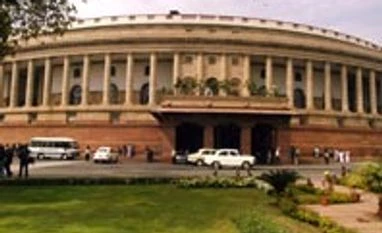Lawmakers cutting across party lines passed the Representation of the People (Amendment and Validation) Bill, 2013, on Tuesday, negating the impact of a recent apex court ruling that barred those in police custody from contesting polls.
By amending sub-clause 5 of section 62 of the RP Act, the Rajya Sabha has cleared the way for those in jail as well as in custody to contest polls.
Law minister Kapil Sibal, who introduced the amendment Bill, said the move need not be misconstrued as an attempt by the political class to clamp down on the efforts to curb criminalisation of politics. “The political class is the most accountable class in the country,” Sibal claimed.
After examining the ruling, the Centre filed a review petition. However, it felt the need to suitably address the situation on its own rather than wait for the outcome of the review petition.
While replying to the debate in the Upper House, Sibal said: “Politicians are accountable to Parliament, to the Election Commission, to the country, to the people, to whom we go every after five years. We are the most accountable set of people in the country... Which other class is accountable to so many institutions?”
He said such court rulings come in an environment where politicians are viewed with suspicion. According to him, the “delicate balance” between various Constitutional institutions would be disturbed by the general perception that all politicians are criminals.
Leader of the Opposition Arun Jaitley said the Supreme Court order empowered a policeman to decide the fate of those seeking to contest elections. “Police became the final arbitrator who can contest and who cannot... Are we going to risk the democracy to the police?” he asked.
Bahujan Samaj Party leader Satish Chandra Mishra said it need not be viewed as a case of Parliament versus judiciary. He, however, expressed his displeasure with the apex court ruling, saying it was not a means of curbing criminalisation of politics.
D Raja of the Communist Party of India called for “redefining the powers of legislative bodies”.
All political parties, ruling and opposition, supported the government in passing the Bill. It will now move to the Lok Sabha for passing before it comes into force.
By amending sub-clause 5 of section 62 of the RP Act, the Rajya Sabha has cleared the way for those in jail as well as in custody to contest polls.
Law minister Kapil Sibal, who introduced the amendment Bill, said the move need not be misconstrued as an attempt by the political class to clamp down on the efforts to curb criminalisation of politics. “The political class is the most accountable class in the country,” Sibal claimed.
More From This Section
On July 10 this year, the Supreme Court had upheld a ruling of the Patna High Court that those in police custody cannot contest polls. The apex court also said the ruling would be with immediate effect.
After examining the ruling, the Centre filed a review petition. However, it felt the need to suitably address the situation on its own rather than wait for the outcome of the review petition.
While replying to the debate in the Upper House, Sibal said: “Politicians are accountable to Parliament, to the Election Commission, to the country, to the people, to whom we go every after five years. We are the most accountable set of people in the country... Which other class is accountable to so many institutions?”
He said such court rulings come in an environment where politicians are viewed with suspicion. According to him, the “delicate balance” between various Constitutional institutions would be disturbed by the general perception that all politicians are criminals.
Leader of the Opposition Arun Jaitley said the Supreme Court order empowered a policeman to decide the fate of those seeking to contest elections. “Police became the final arbitrator who can contest and who cannot... Are we going to risk the democracy to the police?” he asked.
Bahujan Samaj Party leader Satish Chandra Mishra said it need not be viewed as a case of Parliament versus judiciary. He, however, expressed his displeasure with the apex court ruling, saying it was not a means of curbing criminalisation of politics.
D Raja of the Communist Party of India called for “redefining the powers of legislative bodies”.
All political parties, ruling and opposition, supported the government in passing the Bill. It will now move to the Lok Sabha for passing before it comes into force.
)